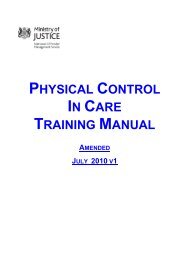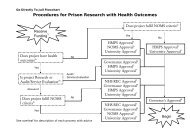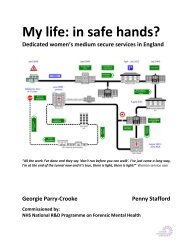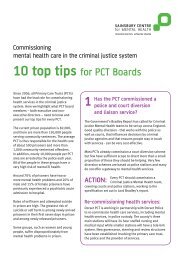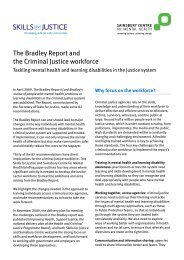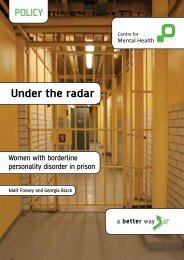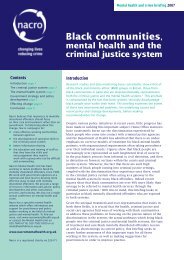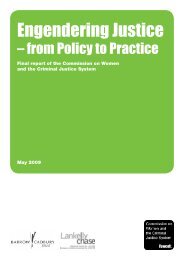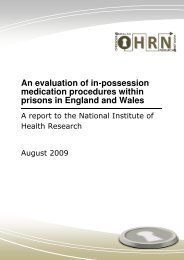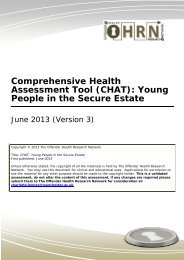Criminal justice liaison and diversion schemes - Offender Health ...
Criminal justice liaison and diversion schemes - Offender Health ...
Criminal justice liaison and diversion schemes - Offender Health ...
Create successful ePaper yourself
Turn your PDF publications into a flip-book with our unique Google optimized e-Paper software.
Mental health briefing 2008Linking with women’s prisonsA common problem was the relatively poor links<strong>schemes</strong> had with women’s prisons. Two relatedissues were noted: the geographic dispersal of thewomen’s estate meant it was often impractical toarrange visits <strong>and</strong> the infrequency of contactmade it difficult to build up workingrelationships with prison health teams. This hasimplications for transferring mental healthassessment information from the scheme to theprison <strong>and</strong> vice versa on release. Although thereare st<strong>and</strong>ard procedures for the notification of aprisoner’s risk of suicide <strong>and</strong> self-harm, otherinformation about mental health may be lost.Scheme 9 had appointed a prison link worker forwomen. Her role was to ensure continuity of care<strong>and</strong> access to services on leaving prison. She alsotried to help women stay in contact with families<strong>and</strong> carers through practical help such asarranging transport for visits.Guidance <strong>and</strong> trainingDespite the emphasis on guidance <strong>and</strong> trainingfor those working with women offenders withmental health needs, 10, 21 only two <strong>schemes</strong>reported receiving any gender-specific training<strong>and</strong> this was focused on self-harm. None of the<strong>schemes</strong> had received guidance on dealing witheating disorders or sexual abuse.User involvementThere is an increasing emphasis on the centralityof the service user in mental health policy 21 <strong>and</strong>regular consultation with service users isrecommended as a routine factor in serviceplanning. 23 None of the <strong>schemes</strong> in our samplehad any routine procedures for collating feedbackfrom their service users or any recent findingsfrom user consultations. Our own limitedendeavours show that it was difficult for thewomen to differentiate the service input they hadfrom different health <strong>and</strong> criminal <strong>justice</strong>agencies, which has implications for any futuremethods <strong>schemes</strong> may use to collect serviceusers’ opinions. The interviews we undertookwith service users (11 in all) did however showthat women were generally positive about theservice provided by the <strong>schemes</strong> <strong>and</strong> gainedvaluable help <strong>and</strong> support from the receivingagencies. The following interview extracts showthe importance the women placed on havingsomeone at court or in the police station who hadtime to listen to their concerns <strong>and</strong> who hadsome underst<strong>and</strong>ing of what they were goingthrough:‘I thought it helped me more, because thenother people get to underst<strong>and</strong> from mypoint of view, rather than just going inthere <strong>and</strong> they don’t underst<strong>and</strong> everything,I mean, at least people then have, youknow, realise reasons why you get yourselfinto trouble… if I could kiss that man, Iwould, from the [CJLD scheme], you know, Iwould, he done wonders for me… <strong>and</strong> heactually sat down <strong>and</strong> he listened to me,you don’t get many people like that.’Wilma, 23 years old‘Just being able to go in <strong>and</strong> speak aboutanything really <strong>and</strong> knowing that it ain’tgoing to go any further. It’s private <strong>and</strong>confidential. Nobody else needs to knowabout it. He’s always saying, it stays in theroom that we’re in. It’s just nice to knowthat he’s not in judgement.’Emily, 24 years oldBelow, Gale, 25 years old, describes her situationbefore <strong>and</strong> after intervention by the CJLD schemewhich led to a transfer to a mental health facility:‘I feel better here [in the secure unit]because in jail I had the voices really bad<strong>and</strong> I was trying to pretend to everybody Iam all right. I was making a joke with itbecause me voices kept saying ‘out thewindow’ <strong>and</strong> I said ‘you’re telling me to goout the window’ <strong>and</strong> I was making a joke ofit. And I was making out I was all right toeveryone because I didn’t want anyonetaking the piss out of me… And I had neverbeen to jail before so I was trying to makeout I was all right when I wasn’t. Where hereI have been able to get better <strong>and</strong> tell thetruth.’ResourcesAs a general point, all the <strong>schemes</strong> talked aboutoperating with very limited resources. Thefollowing extract from an interview with asteering group chair <strong>and</strong> commissioner offorensic services is used to illustrate the issuesfaced by many <strong>schemes</strong>:‘It’s way under capacity… it’s very difficultto keep it on the commissioning agendabecause you are going through this tieringon the commissioning side. You are in there7



